#muses deity
Explore tagged Tumblr posts
Text
Finding Her in the world around me
♡ I find Aphrodite Ourania in the heart shaped clouds, heavenly and all encompassing
♡ I find Aphrodite Pandemos in the rants of my cousin; she talks about how much she loves her girlfriend. Love is for everyone
♡ I find Aphrodite Praxis in the hands of a lover, withing gentle touches full of care
♡ I find Aphrodite Melainis under the covers of Nyx, She fills me with the energy to create gifts for my friends
♡ I find Aphrodite Nymphia in weddings, She walks along the procession congratulating a couple on their new beginning
♡ I find Aphrodite Ambolgera in the wrinkled hands of my grandmother, experienced as she oils my hair and retells stories of her youth
♡ I find Aphrodite Areia in protests, She stands with those fighting for the right to love.
♡ I find Aphrodite Nikephoros in the victory after war, She celebrates with those who are finally free to love
♡ I find Aphrodite Xenia in videos titled 'faith in humanity restored'. She watches with endearment as families meet again
♡ I find Aphrodite Philomeides in the laughter shared with my friends. Our stomachs hurt as She laughs with us
♡ I find Aphrodite Chrysea in the pictures taken during golden hour, She makes my skin shine making me proud of my heritage
mother of desire, richly crowned goddess. I find you everywhere. In the morning dew and moonlight walks, in the tears of a farewell and the tight hugs when we meet again. Everywhere I look, I find you ♡
439 notes
·
View notes
Text
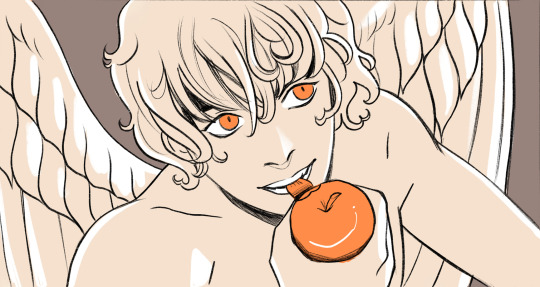
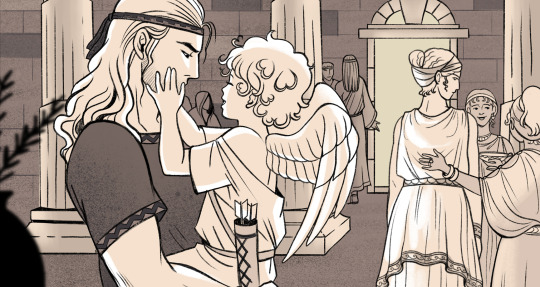
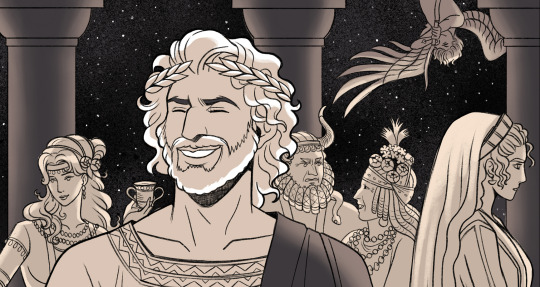
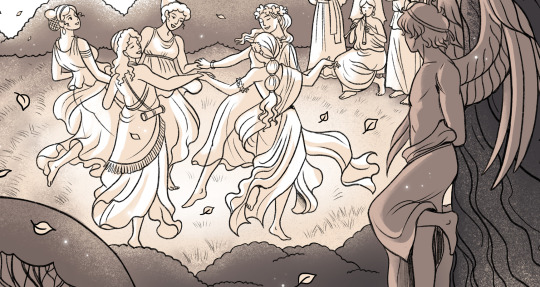

Preview of some panels from a comic feat. Eros and Aphrodite that I'll be posting this weekend.
It's currently up on my Patreon. ✨
1K notes
·
View notes
Text
Statistics of Apollo's Lovers
I was wondering just how unfortunate of a love-life our boy Apollo had, so - as one does - I did the research, math, and writing of said love-life.
such is the life of an adhd teen :)
In total, there are 62 people on this list. I have them separated into eight groups; Immortal, Immortal & Rejected, Lived, Died, Rejected & Died, Rejected & Cursed, Rejected & Lived, and who were Rejected by Apollo
Disclaimer: I am not a historian nor an expert in Greek Mythology, I am just a very invested nerd in Mythology, and in Apollo's mythology in general, and got curious about what his rap sheet actually looks like.
Sidenote: There will be some "lovers" not on this list. Reasons being;
No actual literary sources behind them
Said literary sources are dubious at best
Not enough information is given about the nature of their relationship to make an accurate take
So if somebody isn't on this list, it's because of one of those three reasons. Although there is still a chance I missed somebody! :)
Also, no RRverse lovers include in this list. Sorry my fellow ToA fans.
*I am currently investigating the legitimacy of 2 more potential lovers. As soon as I have reliable sources, I will get them on here ASAP. Their inclusion, however, will not change the overall conclusion. 👍
(Edited 01/15/25 - ALL SECTIONS SOURCED)
Let's begin! :D
Immortal Lovers
Calliope: muse of epic poetry. Mother of Hymenaios and Ialemus (Pindar's 3rd Threnos) by Apollo.
Clio: muse of history
Erato: muse of love poetry
Euterpe: muse of music
Polyhymnia: muse of hymns/sacred poetry
Melpomene: muse of tragedy
Thalia: muse of comedy. Mother of the Corybantes (The Bibliotheca by Pseudo-Apollodorus) by Apollo.
Terpsichore: muse of dance
Urania: muse of astronomy
Boreas: the North Wind. The Boreads called Apollo "beloved of our sire" in Apollonius of Rhodes's Argonautica.
Rhetia: alternate mother of the Corybantes by Apollo. (Strabo's Geography 10.3.21)
11 lovers total here.
10 Female, 1 Male
Immortal & Rejected
Hestia: goddess of the Hearth (Hymn to Aphrodite)
1 Interest. Female.
Lovers Who Lived:
Branchus: mortal shepherd, gifted prophecy (Conon's Narrations 33 & Callimachus's Iambus)
Rhoeo: mortal princess, eventually married an apprentice of Apollo (Diodorus Siculus's Bibliotheca historica 5.62 and Tzetzes on Lycophron 570)
Ourea: demigod daughter of Poseidon, dated Apollo during his punishment with Laomedon; had a son named Ileus, after the city of Troy (Hesiod's Catalogues of Women Fragment 83)
Evadne: nymph daughter of Poseidon, Apollo sent Eileithyia & (in some texts) the Fates to aid in their son's birth (Pindar's Olympian Ode 6)
Thero: great-granddaughter of Heracles, described as "beautiful as moonbeams" (Pausanias's Description of Greece 9)
Cyrene: mortal princess-turned-nymph queen, kick-ass lion wrangler, and mother of two of Apollo's sons - Aristaeus (a god) and Idmon (powerful seer) (Pindar's Pythian Ode 9.6 ff. and Nonnus's Dionysiaca and Callimachus's Hymn to Apollo 85)
Admetus: mortal king, took great care of Apollo during his second punishment, Apollo wingmanned him for Alcestis's hand - basically Apollo doted on him <3 (Callimachus's Hymn II to Apollo and Apollodorus's Bibliotheca 1.9.15 and Hyginus's Fabulae 50–51, and also written about by Ovid and Servius)
Hecuba: queen of Troy, together they had Troilus.
It was foretold that if Troilus lived to adulthood, Troy wouldn't fall - unfortunately, Achilles murdered Troilus in Apollo's temple. When the Achaeans burned Troy down, Apollo rescued Hecuba and brought her to safety in Lycia. (Stesichorus's Fr.108)
Hyrie/Thyrie: mortal. mothered a son by Apollo. Their son, Cycnus, attempted to kill himself after some shenanigans and his mother attempted the same. Apollo turned them into swans to save their lives. (Antoninus Liberalis's Metamorphoses 12 and Ovid's Metamorphoses 7.350)
Dryope: mortal. had a son named Amphissus with Apollo, who was a snake at the time. Later turned into a lotus flower, but it had nothing to do with Apollo so she's still on this list. (noncon; written by Ovid in Metamorphoses 8 CE/AD and later by Antoninus Liberalis in his own Metamorphoses sometime between 100-300 CE/AD)
Creusa: mortal queen. had a son named Ion with Apollo (Euripides's Ion). Please check out @my-name-is-apollo's post for more details because they make some good points about what's considered "rape" in Ancient Greece. I expand on this further at the end of the post.
Melia: Oceanid nymph. Had a son w/h Apollo named Tenerus. (Pausanias's Descriptions of Greece 9.10.5–6)
Melia was said to be kidnapped, and her brother found her with Apollo. He set fire to Apollo's temple in an effort to get her back, but was killed. Melia and Apollo had two kids - but here's the interesting part. Melia was highly worshiped in Thebes, where her brother found her. She was an incredibly important figure in Thebes, especially when connected with Apollo. She and Apollo were essentially the parents of Thebes.
As I read over their story, it sounded like (to me, at least. it's okay if you think otherwise!) that Melia just absconded/eloped with Apollo.
Was kidnapping an equivalent to assault back then? Perhaps. But it's still debated on whenever or not that's true. However, one thing I've noticed reading up on these myths is that when Apollo does do something unsavory, the text says so.
It never says anything about Apollo doing anything to Melia. Her father and brother believe she was kidnapped, but, like mentioned previously, it seems far much more likely that she just ran off with her boyfriend or something.
But that's just my interpretation.
Moving on! :)
Iapis: a favorite lover. Apollo wanted to teach him prophecy, the lyre, ect. but Iapis just wanted to heal :) so Apollo taught him healing :) (Smith 1873, s.v. Iapis)
Aethusa: daughter of Poseidon & the Pleiad Alcyone. Mother of Linus and Eleuther. She is the great-great grandmother of Orpheus. (Apollodorus's Bibliotheca 3.10.1 and Pausanias's Descriptions of Greece 9.20.2 and Suida, s.v. Homer's Of the Origin of Homer and Hesiod and their Contest, Fragment 1.314)
Acacallis: daughter of King Minos. there's a lot of variation on whether or not she had kids with Hermes or Apollo. Some say she had a kid with each. (Stephanus of Byzantium, s.v. Kydōnia (Κυδωνία and Scholia on Apollonius Rhodius, 4.1492)
Chrysothemis: nymph queen who won the oldest contest of the Pythian Games - the singing of a hymn to Apollo. She had three daughters, and one of them is said to be Apollo's. (Pausanias's Descriptions of Greece 10.7.2 and Hyginus's De Astronomica 2.25)
Corycia: naiad. had a son with Apollo. the Corycian Cave north of Delphi is named after her (Hyginus's Fabulae 161)
Leuconoe (also Choine or Philonis): daughter of Eosphorus, god of the planet Venus, and mother of the bard Philammon. (Hyginus's Fabulae 161) She was killed by Diana for her hubris.
Melaena (also Thyia or Kelaino): mother of Delphos, member of prophetic Thriae of Delphi. Priestess of Dionysus. (Herodotus's Histories 7.178.1)
Othreis: mothered Phager by Apollo, and later Meliteus by Zeus. (Antoninus Liberalis's Metamorphoses 13)
Stilbe: mother of Lapithus and Aineus by Apollo. (Diodorus Siculus's Library of History 4.69.1 and Scholia on Apollonius Rhodius, 1.40 and Scholia on Apollonius Rhodius, 1.948)
Syllis (possible same as Hyllis, granddaughter of Heracles): mothered Zeuxippus by Apollo. (Pausanias's Descriptions of Greece 2.6.7)
Amphissa: Apollo seduced her in the form of a shepherd. They had a son named Agreus. (Ovid's Metamorphoses 6.103 and Hyginus's Fabulae 161)
(hey, has anybody else noticed that 'Apollo disguising himself' seems to only be a thing in Roman literature?)
Areia (or Deione): had a son named Miletus. Hid him in some smilax. Her father found him and named him. (Apollodorus's Bibliotheca 3.1.2)
Arsinoe: she and Apollo had a daughter named Eriopis. (Hesiod's Ehoiai 63 and Scholia ad Pindar's Pythian Ode 3.14)
Queen of Orkhomenos (no name is given): Mother of Trophonius (Pausanias's Descriptions of Greece 9.37.5)
(my fellow ToA fans will recognize that name haha).
Hypermnestra: Either Apollo or her husband fathered her son Amphiaraus. (Hyginus's Fabulae 70)
(sidenote: @literallyjusttoa suggested that Apollo was dating both Hypermnestra and Oikles, and I, personally, like that headcannon)
Manto: Daughter of Tiresias. Apollo made her a priestess of Delphi. They had a son named Mopsus. When Apollo sent her to found an oracle elsewhere, he told her to marry the first man she saw outside of Delphi. That man turned out to be Rhacius, who brought her to Claros, where she founded the oracle of Apollo Clarios. (Apollodorus's Bibliotheca E6. 3)
Later, another man named Lampus attempted to assault her, but was killed by Apollo. She is also said to be a priestess who warned Niobe not to insult Leto, and to ask for forgiveness. Niobe did not. (Statius's Thebaid 7 and Ovid's Metamorphoses 6)
(Dante's Inferno places her in the eighth circle of hell, and let me just say- what the FUCK Dante! What did Manto ever do to you, huh??!! Don't do my girl dirty!!)
Parthenope: granddaughter of a river god. Mothered Lycomedes by Apollo (Pausanius's Descriptions of Greece 4.1)
Phthia: prophetess. called "beloved of Apollo". Mother three kings by him; Dorus, Laodocus, & Polypoetes (Apollodorus's Bibliotheca 1.7.6)
Procleia: Mother of Tenes, son of Apollo, who was killed by Achilles before the Trojan War. Daughter of King Laomedon, king of Troy. (Apollodorus's Epitome 3. 26)
Helenus: prince of Troy. Received from Apollo an ivory bow which he used to wound Achilles in the hand. (Photius's 'Bibliotheca excerpts')
Hippolytus of Sicyon: called "beloved of Apollo" in Plutarch's Life of Numa. I don't think this guy is the same as Hippolytus, son of Zeuxippus (son of Apollo), king of Sicyon Pausanias talks about in his Description of Greece. That would be a little weird taking the whole family tree into account - though it's never stopped other gods before. *shrug*
Psamathe: nereid, said to be the personification of the sand of the sea-shore. (Conon's Narrationes 19)
She and Apollo were lovers, but never had any kids. When another man assaulted her, she had a son and abandoned him.
(He was found by some shepherds dw - wait, he was then torn apart by dogs. Nevermind.)
Back to her, her father ordered for her to be executed and Apollo avenged her death by sending a plague onto Argos and refused to stop it until Psamathe and Phocus/Linus (her son) were properly given honors.
(I really like how even though Linus isn't Apollo's kid, and that Psamathe wanted nothing to do with the kid, Apollo still considered him worth avenging too <3 )
Okay, in a previous incarnation of this post, I said there was a version where she is raped by Apollo...however, I can't find any sources to back it up😅 Even her wiki page doesn't mention rape, and Theoi's excerpt of Paunasias's Descriptions of Greece about her doesn't either.
So where did I hear about this supposed version? (Don't shoot)
Youtube. A youtube video about Apollo. Yeah...
Lesson, kids! Don't trust youtube videos on mythology! Yes, even if they dedicated lots of time to it! They can still get things wrong! In fact, don't even take my word for it! Do your own research <3
Hymenaeus: No, not his kid. This is a different Hymenaeus haha! This Hymenaeus is the son of Magnes, and comes from Megalai Ehoiai fr. 16, commonly attributed to Hesiod, and Antonius Liberalis's Metamorphosis. Legend states that while Apollo was preoccupied with Hymenaeus, baby Hermes stole his cows ;)
Euboia: Daughter of Macareus. Bore a son named Agreus. (Hyginus's Fabulae 161)
Alright. 36 lovers here.
6 Male. 30 Female.
34 are 100% consensual. Creusa is questionable, depending on who's translating/which tradition you go with. Dryope is noncon.
Lovers Who Died:
Hyacinthus*: mortal prince. we all know this one, right? Right? one and only true love turned into flower (okay that's my bias speaking but AM I WRONG?) (Plutarch's Life of Numa, 4.5; Philostratus the younger's Imagines; Pseudo-Apollodorus's Bibliotheca 1.3.3; Ovid's Metamorphoses 10.162–219; Bion's Poems 11; and various pieces of art)
Cyparissus: mortal. his DEER DIED and he asked Apollo to let him MOURN FOREVER so he was turned into a cypress tree (Ovid's Metamorphoses X 106ff)
Coronis: mortal princess. cheated on Apollo w/h Ischys, who in Fabulae was killed by Zeus. mother of Asclepius. killed by Artemis. (Pindar's Pythian Odes 3.5; Pausanias's Descriptions of Greece 2.26.6; Hyginus's Fabulae 202; Ovid's Metamorphoses 2.536 and 2.596; Hyginus's De Astronomica 2.40; Isyllus's Hymn to Asclepius 128.37 ff.)
There is another version of Asclepius's birth given by Pausanias in Descriptions of Greece 2.26.1-7, where Coronis exposes him on a mountain and Apollo takes him in.
Adonis: yes, THAT Adonis. he's in this category because. well. he died. rip (Ptolemy Hephaestion's New History Book 5)
Phorbas: Okay so Apollo's lover Phorbas and another Phorbas sometimes get mashed together so this is what I was able to gather.
Plutarch's Life of Numa 4.5 and Hyginus's De Astronomia 2.14.5 cites Phorbas as Apollo's lover. The other Phorbas is said to be a rival to Apollo in the Homeric Hymn to Apollo. Personally, I separate the two because it makes more sense with Phorbas the lover's overall story.
Here it is: The island of Rhodes fell victim to a plague of dragons or serpents, and the oracle said to summon Phorbas for help. He defeated the infestation, and after he died, Apollo asked Zeus to place him in the stars, and so Phorbas became the constellation Serpentarius, also known more widely as Ophiuchus (a man holding a serpent).
FORGET ORION AND HIS ONE-OFF MENTION OF BEING DIANA'S LOVER HERE IS A CONSTELLATION TRAGIC LOVE STORY!!!!!
(*Hyacinthus was resurrected, as celebrated in the Hyacinthia festival in Sparta. Nonnus's Dionysiaca 19.102 and Pausanias's Descriptions of Greece 3.19.4 supports this belief as well.)
5 lovers.
4 Male. 1 Female. All consensual.
Sidenote: QUIT BURYING THE GAYS GREECE!!!!
Love-Interests Who Rejected & Died:
Daphne: do i nEED to say anything? Nymph. turned into tree to escape.
Daphne and Apollo actually go back a bit. Their story was used to explain why the laurel was so sacred to Apollo. It's in Delphi, Branchus planted laurel trees around the temple he built to Apollo, the laurel was even sacred to Apollo's historical forebearer Apulu, an Etruscan god! (I have sources to back this up :3 along with an Essay.)
Apollo & Daphne first originate from Phylarchus, but we do not have any of his work :( It's been lost to history...a moment of silence RIP. He was a contemporary in the 3rd century BC/BCE (first day of 300 BC/BCE and last day of 201 BC/BCE).
He was, however, cited as a source in Parthenius's Erotica Pathemata, written sometime in the 1 century AD/CE (sometime between 66 BC/BCE and the author's death in 14 AD/CE).
Then they show up again in Pausanias's Descriptions of Greece, written between 150 AD/CE and 170 AD/CE.
Hyginus wrote his Fabulae sometime before Ovid's because it's widely criticized to be his earliest work and Ovid wrote his Metamorphoses in 8 AD/CE.
The first two versions are roughly the same, and Ovid's shares similarities with the first in only the ending. Hyginus is basically like Ovid's but without Eros.
So in publication order, it's; Erotica Pathemata, Fabulae, Metamorphoses, then Descrip. of Greece.
In Erotica Pathemata, Daphne is the daughter of Amyclas and is being courted by Leucippus. She is not interested in any sort of romance. Leucippus disguises himself as a girl to get close to her, but his ruse is revealed when Apollo nudges Daphne and her attendants into taking a bath in the river. Leucippus is consequently killed.
Apollo then becomes interested and Daphne runs away, imploring Zeus that "she might be translated away from mortal sight", and is transformed into the laurel tree.
In Fabulae, Daphne's story is a bit more familiar. She's the daughter of Peneus, the river god, and Gaea is the one who transforms her into a laurel tree.
In Metamorphoses, Eros is added to the story and is the reason why Apollo is so enamored and Daphne is so repulsed.
(I would just like to say that in this version, it was 100% nonconsensual for both of them! And I don't mean with rape- Apollo never touches Daphne in any of these version. What I mean here is that Eros maliciously makes Apollo chase down a woman and makes sure Daphne would be repulsed by him. That is noncon behavior there on both sides.)
In Descriptions of Greece 10.7.8, Daphne is the daughter of Ladon and her and Apollo are only connected by way of why the laurel crown is the victory prize of the Pythian Games. However, in Descriptions of Greece 8.20.2-8.20.4, Daphne and Leucippus make an appearance here too, but Apollo is not the reason why they stop to take a swim and his ruse is revealed, resulting in his death.
Castalia: Nymph. turned into spring to escape.
First things first, Castalia was used to explain the existence of the Castalian Spring in Delphi. However, in the Homeric Hymn to Apollo, the spring is already there when Apollo was born. So there's that to consider first.
Anyway, to escape Apollo's advances, Castalia transforms herself into a spring. (Lactantius Placidus's On Statius's Thebaid 1.698. This was written between Lactantius's lifespan of c. 350 – c. 400 AD/CE, placing it firmly in Roman times.)
2 Interests.
2 Female.
Love-Interests Who Rejected & Cursed
Cassandra: mortal princess. Received the gift of prophecy from Apollo. Due to a broken oath, she was then cursed. (Aeschylus's Agamemnon)
It is only in Roman-era tellings where Cassandra is cursed for not sleeping with Apollo, and there was no oath made (Hyginus & Pseudo-Apollodorus). In Agamemnon, it was done so because of the broken oath- not the refusing to sleep with Apollo thing.
The version where she gains prophetic abilities by way of a snake licking her ears is not part of Greco-Roman literature, but rather by an American poet.
Nevertheless, even after the curse Cassandra still loved Apollo, and called him "god most dear to me" in Eurpides's play The Trojan Women.
1 Interests.
1 Female.
Love-Interests Who Rejected & Lived
Sinope: mortal. there are two different version of her myth.
In Diodorus Siculus's Library of History 4.72.2 and Corinna's Frag. 654, Apollo "seizes" her and they have a son named Syrus.
In Apollonius's Argonautica 2.946-951 and Valerius Flaccus's Argonautica 5.109, it is Zeus who abducts her, but she gets him to promise her anything and requests to remain a virgin. He obliges. Later, Apollo and the river Halys both try to charm her, but fall for the same trick.
Library of History was written between 60-30 BC/BCE, Apollonius's Argonautica between 300 BC/BCE and 201 BC/BCE, and Valerius Flaccus's Argonautica between 70-96 AD/CE, making Apollonius's version the oldest and Valerius Flaccus's the youngest.
Marpessa: mortal princess, granddaughter of Ares. Idas, son of Poseidon, kidnapped her and Apollo caught up to them. Zeus had Marpessa chose between them, and she chose Idas, reasoning that she would eventually grow old and Apollo would tire of her. (Homer's The Iliad, 9.557 and Apollodorus's Bibliotheca 1.7.8–9)
Bolina: mortal. Apollo approached her and she flung herself off a cliff. He turned her into a nymph to save her life. (Pausanias's Description of Greece 7.23.4)
Ocroe/Okyrrhoe: nymph and daughter of a river god. asked a boatman to take her home after Apollo approached her. Apollo ended up turning the boat to stone and the seafarer into a fish. (Athenaeus's The Deipnosophists 7.283 E [citing The Founding of Naucratis by Apollonius Rhodius]. The Deipnosophists was written in the early 3rd century AD, between 201 AD and 300 AD)
Sibyl of Cumae: mortal seer. promised to date Apollo if she was given longevity as long as the amount of sand in her hand. he did, but she refused him. (Ovid's Metamorphoses 14)
5 Interests. All female.
Okyrrhoe's story is the only one with any iffy stuff, although, when something iffy does occur, the text usually says so outright.
Rejected by Apollo:
Clytie*: Oceanid nymph. turned into a heliotrope to gaze at the sun forever after the rejection.
1 Advance. Female.
(*Clytie's story was originally about her affection for Helios. [Ovid's Metamorphoses 4.192–270; Ovid used Greek sources about the etymology of the names involved, meaning Clytie and Helios go back to Greek times] As Apollo got superimposed over Helios's myths, people have assumed it is he who is the sun god in her myth and not Helios.)
In Conclusion...
62 people total, and 35 of them have Roman-Era roots with (as far as I know!! Don't take my word as gospel truth!!) no relation to Greece except by way of shared mythology.
Here's the list:
Rhoeo
Thero
Hyrie/Thyrie
Dryope
Melia
Aethusa
Acacallis
Chrysothemis
Corycia
Choine
Thyia
Othreis
Stilbe
Syllis
Amphissa
Areia
Queen of Orkhomenos
Hypermnestra
Manto
Parthenope
Phthia
Procleia
Helenus
Hippolytus of Sicyon
Psamathe
Cyparissus
Adonis
Phorbas
Castalia
Sinope
Bolina
Ocroe/Okyrrhoe
Sibyl of Cumae
Rhetia
Euboia
Meaning, 56%- and really, it's more like 57%, because Clytie is not Apollo's lover at all- of the lovers listed on this post are not entirely Greek in origin (AS FAR AS I KNOW-)! That does not mean ofc that you have to ignore them. I, for one, really like the story of Rhoeo, and Manto, and Psamethe- I find their myths sweet (Rhoeo & Manto) and bittersweet (Psamethe).
Let's get to the calculations now, yeah?
62 people total (Includes Clytie)
50 Women (81%). 12 Men (19%).
18% were Immortal (Including Lovers & Rejected)
68% Lived (Including Lovers & Cursed & Rejected)
14% Died (Including Lovers & Rejected)
1% were Cursed
2% were Rejected by him
61 people total (Not Including Clytie)
49 Women (80%). 12 Men (20%).
18% were Immortal
69% Lived (Lovers & Cursed & Rejected)
12% Died (Lovers & Rejected)
in that 12%, one was apotheosized - Hyacinthus.
Meaning 10% died permanently, while 2% were resurrected.
2% were Cursed
0% were Rejected by him
Additionally, I left off three male lovers and two female lovers - Atymnius, Leucates, Cinyras, Hecate, & Acantha.
Atymnius has no references to being Apollo's lover, only to Zeus's son Sarpedon. (Wikipedia why do you even have him listed? You need sources smh)
Leucates is another male "lover" left off the rack - apparently he jumped off a cliff to avoid Apollo, but I couldn't find any mythological text to account for it- and no, OSP's wiki page is not a reliable source. There is a cliff named similarly to him where Aphrodite went (by Apollo's advice) to rid herself of her longing for Adonis after his death. Also Zeus uses it to rid himself of his love for Hera before he...well, commits adultery again. 🤷
Cinyras was a priest of Aphrodite on the island of Cyprus. He was also the island's king. Pindar calls him "beloved of Apollo" in his Pythian Ode. However, looking further into Cinyras's life throws a bit of a wrench into it. He's also cited to be a challenger to Apollo's skill, and either Apollo or Mars (Ares) kills him for his hubris.
(honestly, I kinda like the idea that Mars went into Big Brother Mode)
I did consider leaving him on the list, since technically you could argue it was a romance-gone-bad, but among every other source Cinyras is mentioned in, Pindar's the only one who puts a romantic label on him and Apollo.
Plus, he’s been described as a son of Apollo too, and I personally like that more lol
Hecate, the goddess of magic and crossroads, is said to be the mother of Scylla (like, the sea-monster) by Apollo, but Scylla's parentage is one of those "no specific parents" ones, so I left her off the list.
Acantha has absolutely no classical references. There's a plant like her name, but she's made-up, so she doesn't count. *stink-eyes the guy who invented her and claimed his “sources” were reliable when they really aren’t*
(Of course, I could be wrong about any of these. Again, I'm not an expert.)
With all this in mind, this means Apollo's love life actually isn't as tragic as media portrays it, and he isn't as bad as Zeus or Poseidon in the nonconsensual area.
Does he still have those kinds of myths? Yes, with Dryope and Creusa; though, we can discount Creusa because;
1) Depends on who's translating it; and
2) Ion is given different parentage in the Bibliotheca, which yes, came much after Ion, however Xuthus was traditionally considered to be Ion's father rather than Apollo. This means there was probably a different oral tradition on Ion's parentage that just wasn't written down as early as Euripides's was- in fact, it may even just be an invention of Euripides's.
(and honestly Apollo's characterization in Ion just doesn't quite match up with the rest of his appearances in the wider myths (in my opinion, at least))
So that leaves us with just Dryope, who comes from Ovid, a Roman poet, and Antoninus Liberalis, a late Greek one.
Now I'm not saying we should throw her out because of Ovid's whole "wrote the gods even more terribly to criticize Augustus" thing, but it is something to keep in mind. Political mechanics have been used to change myths before, and this is certainly one example of it.
Additionally, I have seen many people discard Dionysus's rapes in the Dionysiaca because of how late it was written, so this one can be given similar treatment if one choses too because of just how late Ovid and Antoninus Liberalis's work was.
You can, in fact, pick and chose if you wish, especially if it'll increase your enjoyment of literature. That's certainly what I do :)
So overall, I'd say Apollo has a rather clean relationship past. He's doing pretty damn good.
Also, I think we should all take note that even if Apollo had noncon myths, that doesn't reflect on the actual god. The Ancient Greeks did not see the myths as "canon" to their gods- in fact, some were not happy with the myths showing the gods in such a light.
That's something else to keep in mind. The gods of the myths are not the gods of Greece, and are more like parables or fables for the Ancient Greeks I'd say. Lessons on morality and such, and of course, warnings against hubris and the like.
This was quite the journey, and I really hope you all enjoyed reading and learning with me! This really makes me wonder- if Apollo's love life is this good, I wonder how misinformed we are on everyone else's? I have no plans on doing Zeus or Poseidon or anyone else (not for a LONG time lol, this took a lot of effort and research!), but if anyone has any idea, or gets inspired to do something like this for any other god, please tag me!! I'd love to see it! :D
And since this was on a previous reblog, here be a meme from a while ago:
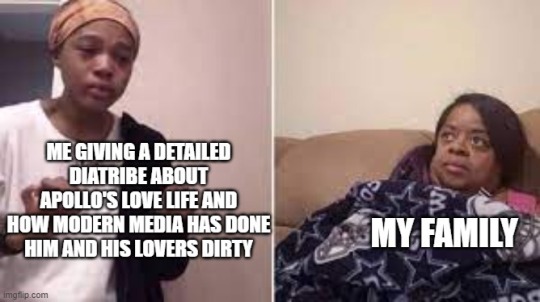
[ID: Me Explaining Me. On the left is a girl with her hands up, fingers pinched together, like she's intensely explaining something. The text over her says "Me giving a detailed diatribe about Apollo's love life and how modern media has done him and his lovers dirty". On the right is the girl's mother, wrapped up to her chin in a blanket, with a look on her face that screams "absolutely done with this shit". The Mother is labeled "My family". /End ID]
suffers in I'm the only mythology nerd in the family
#ramblings of an oracle#greek mythology analysis#apollo#greek myths#greek gods#greek myth#ancient greece#still gonna tag this as toa#just because#;)#the trials of apollo#toa#trials of apollo#tagamemnon#greek history#ancient greek#greek mythology#greek tumblr#ancient rome#ancient history#rome#greece#apollon#apollo deity#hyacinthus#hyacinth#apollo x hyacinthus#apollo and hyacinthus#cassandra of troy#the muses
1K notes
·
View notes
Text
LESSER-KNOWN TITLES OF LADY ATHENE
★ aethyia - refers to Her as a teacher of ship-building and navigation
★ ageliea - as the leader/protector of people
★ agoraea - protector of assemblies of people
★ anemotis - subduer of winds
★ axeiopoenos - the avenger / returning vengeance
★ chalinitis - tamer of horses
★ mechaneus - skilled in inventing
★ kissaia - of the growing ivy
★ paionia - healer
110 notes
·
View notes
Text
Altoid Altars
⋆⁺₊⋆ ━━━━⊱༒︎ • ༒︎⊰━━━━ ⋆⁺₊⋆
Left: Melpomene, Thaleia | Right: Apollon, Athene



Planning to make one for Lady Tykhe and *Possibly* Lady Aphrodite (Votive offering).

#hellenic pagan#apollon devotee#hellenic polytheism#hellenism#helpol#paganblr#paganism#hellenic paganism#greek mythology#muses#melpomene#thalia#thaleia#athene#athena devotee#apollon worship#athena worship#lady athena#lord apollo#apollo deity#athena deity#altoids#altar#pagan altar
72 notes
·
View notes
Text
A bunch more of these quick thumbnails (this au is genuinely devouring my brain 24/7 /pos)





I'm incredibly tempted to fully draw a bunch of different scenes, eventually I'll cook something up :P
#mcsm#forest deity au#mcsm au#minecraft story mode#mcsm lukas#mcsm jesse#doodle#sketch#robotic's art#this au has actually become my muse and I don't know what to do with that information /pos
97 notes
·
View notes
Text
The Muses
Lord Apollon is often referred to as the Leader of the Mused, and depicted with Them, and I’d like to honor Them as well as Him with introducing Them!
The Muses
There are 3 sets of Mousai (Muses)
- The Mousai Titanides, 3 or 4 elder Muses, children of Ouranos and Gaia
- The 9 Olympian Mousai, the ones I’m mostly talking about in this post
- The Mousai Apollonides, 3 daughters of Apollon
The 9 Muses are goddesses of music, song, dance, knowledge, and inspiration. They are children of Zeus and Mnemosyne.
The Muses are Kalliope (epic poetry), Kleio (history), Euterpe (lyric poetry), Melopmene (tragedy), Terpsichore (choral dance and song), Erato (Erotic poetry), Polymnia (sublime hymn), Ourania (astronomy), and Thalia (comedy).
#the song of apollon#shrine songs#hellenic polytheism#apollo#apollo deity#apollo devotee#apollo devotion#apollo god#apollo greek god#apollo greek mythology#apollo worship#muses#9 muses#the 9 muses#kalliope#kleio#ourania#polymnia#erato#terpsichore#euterpe#melopmene#thalia muse#hellenic devotion#hellenic worship#hellenic polythiest#hellenic deities#hellenic polytheistic#hellenic pagan#hellenic gods
80 notes
·
View notes
Text
Lady Terpsichore
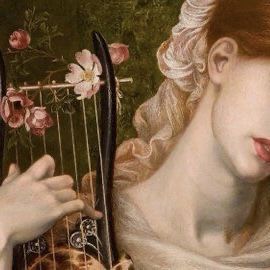








Goddess of dance and chorus
I take requests
#Terpsichore devotee#devotee#greek gods#greek mythology#ancient greek#Terpsichore deity#tyche worship#hellenic pagan#paganism#pagan#hellenic polytheism#hellenic polytheistic#hellenic devotion#hellenic polythiest#hellenic deities#hellenic gods#hellenic polytheist#hellenism#hellenic pantheon#lady Terpsichore#Terpsichore devotion#greek goddess#Terpsichore#muses#muse#lord Apollon muses
58 notes
·
View notes
Text

#succulentsiren#etc#statue#goddess#goddess statue#dark feminine energy#art of seduction#divine goddess#pussy power#dark femininity#divine feminine#femininity#art#muse#dark goddess#deity#venus#feminine#female#woman#womban#beauty#siren#statues#gods#artwork#muses#museum
43 notes
·
View notes
Text
Hestia is more than just fire.
She is in the warmth of freshly-dried clothes, the joy of a child picking paint for their room. The scent of your favorite cleaner and the theme song of your favorite show. You feel her in the familiar creaking of floorboards, the inattentive habit of taking the turn that brings you home. She is the Hearth, and the Hearth is a thing we create in the mundane patterns of our choices and the efficient routines we create over time.
I worship her by noticing these habits in their infancy and attending to them with intention. I devote myself to appreciating their ease and familiarity. I practice my faith by remembering, consciously, the thousands of small kindnesses I have surrounded myself with.
Hestia, who is Home… we create each other.
74 notes
·
View notes
Text
˚ʚ♡ Hypnos & the Erotes ♡ɞ˚



I'm sure you're all familar with Hypnos and the Erotes, respectively. But it's not as common to hear about them working together. Although, it is quite logical when you put some thought to it; "Sleep and Love, after all, are activities that both have the bed in common." - Sleep and Death
Unfortunately, most of what we know about Hypnos' association with love and the Erotes comes from Nonnus.
"Nonnus (flourished 5th century ad, b. Panopolis, Egypt) was the most notable Greek epic poet of the Roman period. His chief work is the Dionysiaca, a hexameter poem in 48 books" - Britannica

Here are a few quotes from 'Nonnus, Dionysiaca' [theoi.com]
Nonnus, Dionysiaca 31. 103 ff : ". . . Then Hypnos as one obeying a mother started up, and swore to charm the eyes of unresting Zeus even until the third dawn should come; but Iris begged him to fasten Kronion (Cronion) with slumber for the course of one day only. There Hypnos remained, awaiting the happy season of marriage. Then goddess Iris returned flying at speed and hastened to deliver her welcome message to her queen."
Nonnus, Dionysiaca 32. 95 ff : ". . . [and after their lovemaking] Hypnos (Sleep) the servant of the Erotes (Loves) had charmed the eyes of Zeus . . . Zeus slept delicately charmed among the flowers, holding his wife in his arms on that bed unseen."
Nonnus, Dionysiaca 42. 336 ff : "He [Dionysos in love] sorrowfully prayed to Hypnos (Sleep) and Eros (Love) and Aphrodite of the Evening [the star Venus], all at once, to let him see the same vision [of his love] once more, longing for the deceptive phantom of an embrace."
Nonnus, Dionysiaca 47. 345 ff : "[Ariadne laments her fate after being abandoned in her sleep by Theseus on Naxos :] ‘Give me again, Hypnos (Sleep), your empty boon, so pleasant; send me another delectable dream like that, so that I may know the sweet bed of love in a deceptive dream! Only linger upon my eyes, that I may know the unreal passion of married love in a dream!’"
Nonnus, Dionysiaca 48. 264 ff : "The maiden [the virgin Aura] awoke . . . [and] bold Hypnos (Sleep) she reproached more than all and threatening the Oneiros (Dream) [i.e. for sending her a prophetic dream in which she loses her virginity to Dionysos]."
! CW : rape ! Nonnus, Dionysiaca 48. 621 ff : "Iobakkhos (Iobacchus) [Dionysos] seeing her [Aura asleep] on the bare earth, plucking the Lethaean (Forgetful) feather of bridal Hypnos (Sleep), he crept up noiseless, unshod, on tiptoe, and approached Aura where she lay without voice or hearing. With gentle hand he put away the girl's neat quiver and hid the bow in a hole in the rock, that she might not shake off Hypnos' (Sleep's) wing and shoot him . . . On the ground that hapless girl heavy with wine, unmoving, was wedded to Dionysos; Hypnos (Sleep) embraced the body of Aura with overshadowing wings, and he was marshal of the wedding for Bakkhos (Bacchus), for he also had experience of love, he is yokefellow of Selene (the Moon), he is companion of the Erotes (Loves) in nightly caresses."

And some non-Nonnus ones
Greek Lyric V Anonymous, Fragment 929g (Rainer papyrus) (trans. Campbell) : "Soft-eyed Hypnos (Sleep) came, embracing all his limbs, as a mother on seeing her dear son after a long absence folds him with her wings to her loving breast."
Licymnius, Fragment 771 (from Athenaeus, Scholars at Dinner) (trans. Campbell, Vol. Greek Lyric V) (Greek lyric C4th B.C.) : "[Endymion was a handsome youth loved by the moon-goddess Selene. He was granted immortality in a state of eternal slumber :] Likymnios of Khios (Licymnius of Chios) says the Hypnos (Sleep) loves Endymion and does not close they eyes of his beloved boy even while he is asleep, but lulls him to rest with eyes wide open so that he may without interruption enjoy the pleasure of gazing at them. His words are ‘And Hypnos (Sleep), rejoicing in the rays of his eyes, would lull the boy to rest with eyes wide open.’"
^^ I understand that this one can simply be interpreted as one of his 'love stories' as most of the Theoi have them. However I thought it nice that it was said that He loved Endymion so much that He (Sleep) stayed with him forever; being forever in slumber.

Cult images depicting Him with the Mousai (Muses) and Aphrodite
Pausanias, Description of Greece 2. 31. 3 : "Not far from the Mousai's (Muses') hall [at Troizenos (Troezen) in Argolis] is an old altar, which also, according to report, was dedicated by Ardalos. Upon it they sacrifice to the Mousai and to Hypnos (Sleep), saying that Hypnos is the god that is dearest to the Mousai."
Pausanias, Description of Greece 2. 31. 5 : "[At Troizenos (Troezen) in Argolis there is] an ancient altar . . . they sacrifice on it to Hypnos (Sleep) and the Mousai (Muses); who they say are particular friends."
Pausanias, Description of Greece 3. 18. 1 : "[Beside the temple of Athena of the Bronze House in Sparta :] Near the statues of Pausanias is an image of Aphrodite Ambologera (Postponer of Old Age), which was set up in accordance with an oracle; there are also images of Hypnos (Sleep) and of Thanatos (Death). They think them brothers, in accordance with the verses in the Iliad."
Little other bits!
Hypnos is married to Pasithea, one of the Charites, which slightly solidifies his association with 'love-like', good feelings; as the Charites presided over "grace, beauty, adornment, joy, mirth, festivity, dance and song."
His role in the myth of Endymion in which, depending on the version, was in love with Endymion himself or acted as a 'wing-man' for Selene in a way. <- linked a previous post of mine about the variations of the myth!

And yes, at the end there I did include his (more well-known) affiliation with the Mousai; I did this because, although not romantic (with exception for Erato), the Mousai can represent to some extent the love we feel for ourselves, for friends, the passion of a new hobby, the love of happiness, and really just a love for life. Since the Greeks didn't view love as a catch-all-term and had specific names for each type of love, I though it was fitting to also include his beloved friends, the Mousai.
Although we have little information on Hypnos' depiction as an Erote / companion to the Erotes. We can make the connection that the role of sleep and the role of love have much in common.
The bedroom, a holy place for sleep and love. Where intimacy and dreams mingle together. Dreaming about your lover, or of a friend (philia). Waking up next to someone, their arms around you as you remember the previous night (doesn't have to be sex, you could have just embraced each other in your sleep). Winding down after a long day by laying down and reading in bed, your partner joining you, just laying in silence. The giggles of a sleepover. The comfort of your pet snuggling up next to you. The solace you feel when your head hits the pillow, loving yourself and treating you to an early sleep. Anything!
Do I personally regard Hypnos as a love god? Yes and no. My perspective lies within the wording of it; and since this is purely my opinion, I will label this next part as !UPG! Okay, so. I think it would be wrong to say that Hypnos is a 'love god' or a 'god of love', because he is not, he's the god and daimon of sleep; with dreams, altered consciousness, and relaxation / wellbeings being under this domain as well - notice, love is not listed. However, would I ever reach out to Lord Hypnos concerning love? Personally, yes. I don't believe love to ultimately fall under his domains, but he can assist. I sometimes call him an 'assistant to Aphrodite' [or an 'assistant to love'], because that is how I personally view his role regarding love, assisting. To put it into a lil metaphor; Think of Aphrodite as a full-time, dedicated, expert-in-the-field person for Love - and Hypnos as a Casual-worker, called in when needed, knows how to work in the department but doesn't specialise there. Does that make sense? It does to me. Either way, this paragraph was just my personal view on it, if yours doesn't match mine that is totally fine. This aspect of Hypnos is nuanced and gives a huge allowance for UPG.

Anyway, let me know if I missed anything or you'd like to share your own interpretation of Hypnos' love aspect! I'd love to hear them! [heh]
May Hypnos bless you, and sweet dreams ♡


-> heart divider made by @/strangergraphics -> sleep [zzzz] divider made by @/sisterlucifergraphics
#the banks of lethe#banks of lethe research#hypnos and the erotes#lord hypnos#research post#hypnos deity#helpol#hypnos shrine#hypnos devotee#hellenic polythiest#hellenic polytheism#hypnos god#hypnos worship#the erotes#erotes#the mousai#mousai#the muses#love#sleep and love
41 notes
·
View notes
Text



. ݁₊ ⊹ . ݁˖ . ݁. ݁₊ APHRODITE PANDÊMOS . ݁₊ ⊹ . ݁݁₊ ⊹



. ݁₊ ⊹ . ݁˖ . ݁ APHRODITE COMMON TO ALL ݁˖ . ݁. ݁₊



something tells me I'm going to love you forever
80 notes
·
View notes
Text
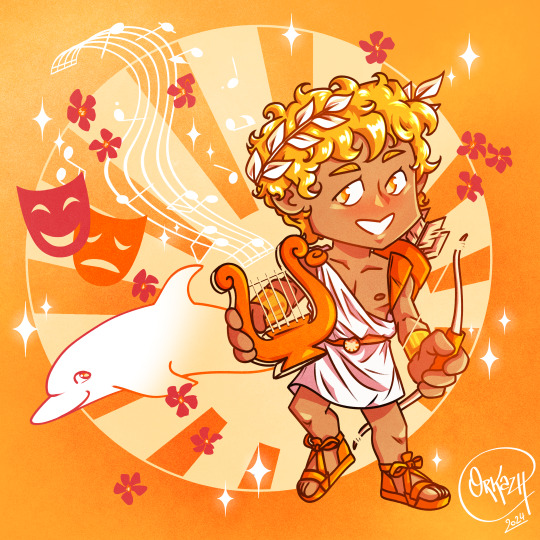
[🏺Greek Gods Series - #2✨]
☀️🏹Apollo, God of Oracles, Healing, Archery, Music & the Arts 🎵 🎭
#apollo#greek mythology#greek myth#greek gods#greek god#greek myth art#ancient greece#chibi art#chibi greek gods#greek pantheon#the 12 olympians#olympus#polytheism#hellenic polytheism#hellenic pagan#hellenic deities#delphi#muses#nine muses
225 notes
·
View notes
Text









𝒎𝒆𝒍𝒑𝒐𝒎𝒆𝒏𝒆 ; 𝒈𝒐𝒅𝒅𝒆𝒔𝒔 𝒎𝒖𝒔𝒆 𝒐𝒇 𝒕𝒓𝒂𝒈𝒆𝒅𝒚 🎭🏛
[please reblog or like if you saved]
#melpomene#mousai#nine muses#greek god#greek gods#greek goddess#greek deity#greek god aesthetic#greek god art#greek pantheon#greek pagan#greek paganism#greek polytheist#greek polytheism#greek myth#greek myth aesthetic#greek myth art#greek mythology#greek mythology aesthetic#greek mythology art#hellenism#hellenistic#hellenic paganism#hellenic pagan#hellenic pantheon#hellenic polythiest#hellenic polytheism#hellenic gods#hellenic deities#9muses
34 notes
·
View notes
Text










💭 the nine muses: goddesses of the arts
longer post below the cut
over the next two weeks or so i'm intending to make a post on each muse to give myself an opportunity to talk a little more about their sphere of influence and domain <3 but this is a more general post about all nine mousai.
the most common tale of their origin (& the one i personally ascribe to), says that the muses are the daughters of the partnership between mnemosyne & zeus. zeus visited mnemosyne on nine consecutive nights, and a year later she bore nine children of this partnership, and these daughters were the muses.
in earlier myths, the muses were considered patron goddesses of poetry or music more generally - and in fact this is where the modern word "music" comes from, the ancient greek word mousiké meaning "art of the muses". but in the time following their origin, their sphere of influence evolves, and each muse comes to have her own respective domain in the form of a specific kind of art or humanity or science (which also gives us the word "museum" - from mouseion, or "seat of the muses".) the mousai are most chiefly associated with the following in simple terms (though most have secondary domains, which i will explore more in their individual posts):
🏛️ clio, muse of history
🪈 euterpe, muse of music
🎭 thalia, muse of comedy
🗡️ melpomene, muse of tragedy
🎼 terpsichore, muse of dance
💭 erato, muse of erotic poetry
☁️ polyhymnia, muse of sacred poetry & hymn
🌌 urania, muse of astronomy
📜 calliope, muse of eloquence & epic poetry
the mousai also collectively have associations with memory because of their mother, mnemosyne, titaness of memory & remembrance. they are said to be goddesses of knowledge in this way, in that they remember everything which has come to be. they are also said to aid in forgetting, hesiod narrated that the muses bring forgetfulness of pain & cessation of obligations. plutarch stated in some places all nine mousai were known collectively by the name mneiae (or remembrances).
in olympus, the mousai are said to perform for the other olympian deities, and are closely associated with apollo, as god of music & dance. he is sometimes said to lead the choir of the muses, or be depicted as the leader of the muses.
#✉️ . . . lorie's babble#helpol#mnemosyne#zeus#the muses#the mousai#hellenic religion#hellenic pantheon#minor goddesses#goddesses#hellenic deities
32 notes
·
View notes
Text


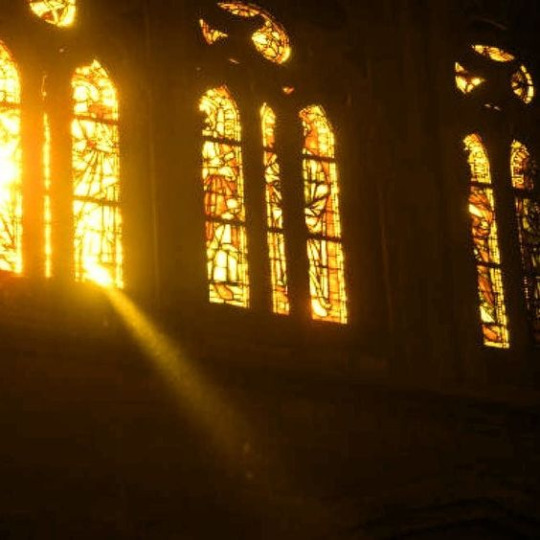
I feel Apollon in my veins. I feel his hands guide mine as I pour my soul into the piano. I hear his voice, gentle as the summer sun urging me to keep going. letting me know that I am not too ambitious for choosing to seek knowledge. I feel his rage in my blood when men speak to me as if I know nothing. As I walk to perform or present a project, I know he is there. Watching over me and when I am done, his cheers are always the loudest.
steady and firm, a strict teacher and a gentle healer. Letting me know that I will be okay. Someday, I will wake up, greet the sun and the joy I shall feel will not be a lie.


#haven't written in while#a little something from the archives#NIKE MUSINGS#devotional writing#apollo worship#apollo deity#hellenic polytheism#helpol#hellenic paganism#apollon worship
229 notes
·
View notes